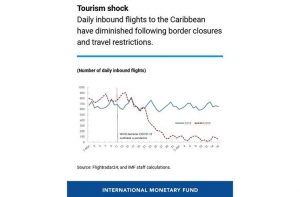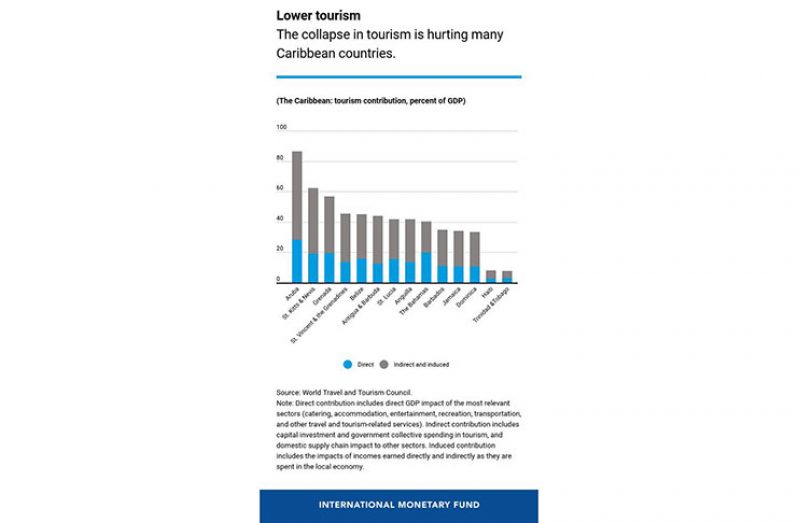— IMF considers tourism, remittance loss and coming hurricane season
THE International Monetary Fund (IMF) has projected that the Caribbean economy will shrink by 6.2 per cent in 2020 as a result of the COVID-19 pandemic.
Many countries in the Region since March 2020 have closed their ports and borders as the only means to prevent further importation of the virus which has already infected over 11,000 in the Caribbean and killed over 470.
The Region is highly dependent on tourism and with the collective ban on international travel, the hospitality and tourism sector has taken a steep plunge. Most hotels are empty and those still operating are doing so with skeleton staffs, at a loss of profits and with just a few guests.
In a blog posted on its site on Wednesday, the IMF said that this would be the deepest recession for the Caribbean in more than half a century.
The IMF noted that the global cruise line and air travel industries have come to a halt with major cruise companies cancelling sailings through June and most airlines reducing or suspending service to the Region.
Meanwhile, key tourism source markets for the Region in North America and Europe are “crippled by the pandemic”
“This, together with tight border controls and travel restrictions, has led to massive hotel booking cancellations and temporary resort closures, putting numerous people in the service sector out of work,” the IMF stated. “There is also a risk that the ‘fear factor’ associated with the virus could have a long-lasting impact on tourism in the Region, even after the pandemic recedes.”
However, this is not all, as the IMF took into consideration the economic fallout beyond tourism. It noted that the “steep drop in commodity prices” is affecting commodity exporters such as Guyana, Suriname, and Trinidad and Tobago through a loss in exports and fiscal revenues.
Meanwhile, energy companies may be forced to cut back production plans in anticipation of weaker energy demand resulting from a contraction in global manufacturing activity.
“For oil-importing countries in the Region, lower oil prices will provide a buffer to the shock,” the IMF blog stated.
Added to this, with the United States, the United Kingdom, and Canada in deep recession, remittance flows to the Region are expected to fall sharply. Remittances average about seven per cent of the Region’s output and exceed 15 per cent of Gross Domestic Product
(GDP) in Haiti and Jamaica.
The World Bank too has projected a sharp decline in remittances for 2020 at about 20 per cent largely due to a fall in the wages and employment of migrant workers.
This will be coupled with supply-chain disruptions which could affect capital projects; loss of investor confidence which could put further pressure on the fiscal accounts and high fiscal costs associated with managing local outbreaks which can potentially worsen the pandemic’s financial impact.
As if the grim effects of COVID-19 are not already tenfold, the Caribbean, in just a few weeks, will have to juggle the pandemic crisis with the impending hurricane season.
“The upcoming hurricane season poses additional risks to these already budget-strapped economies. To sustain the economy during the crisis and contribute to a faster recovery, countries will need to allocate resources to vulnerable groups affected by the pandemic,” the blog stated.
The IMF indicated that while the Caribbean has shown foresight in pursuing containment and mitigation measures and adopting contingency and preparedness plans, most countries will have limited spending room to cushion the economic impact of the pandemic.
Most Caribbean countries have already announced fiscal packages to increase spending in key areas and some central banks and regulators are supporting economic activity, but further fiscal, monetary and credit-easing measures will likely be needed.
The IMF said that it is actively engaging Caribbean countries to offer policy advice and assistance, especially to those with pressing financing needs to cope with the pandemic.
It has already deployed financial resources to Haiti, Dominica, Grenada, and St. Lucia, while emergency assistance for three additional Caribbean countries, including Jamaica, will be considered by the IMF’s Executive Board in the coming weeks.
Barbados has also requested an augmentation of its existing Extended Fund Facility and altogether, up to US$2.5 billion could be made available immediately to the Region.





.jpg)








